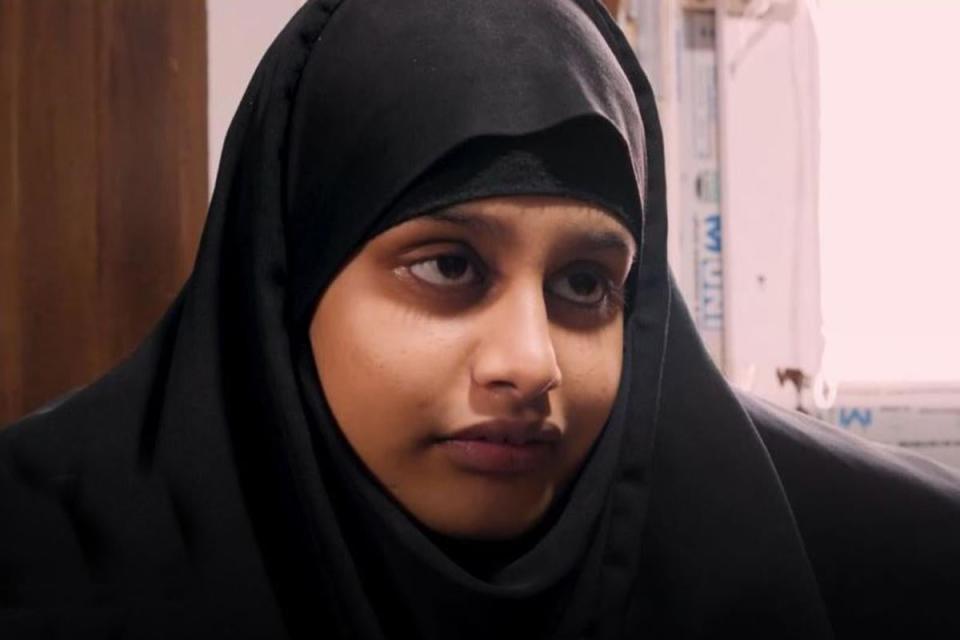Shamima Begum’s struggle to regain British citizenship is ‘self-inflicted’, Supreme Court told

Shamima Begum travelled to Syria in 2015
Shamima Begum’s inability to access the legal battle over her British citizenship is “self-inflicted”, the Supreme Court has been told.
A barrister representing the home secretary said the 21-year-old continued to be detained in a Syrian camp alongside other women and children caught leaving Isis territory.
“Begum’s situation now in the al-Roj camp and the problems that create for her appeal are not the consequences of anything done by the secretary of state – on the contrary they are self-inflicted,” Sir James Eadie QC said on Monday.
“The reason she is where she is that she went to Syria and aligned with Isis.”
The barrister said Begum would present a national security risk if allowed to return to Britain, adding: “The exposure of the public to an increased risk of terrorism is not justifiable or appropriate in this case on fairness grounds.”
Begum left the UK for Syria aged 15, with two other schoolgirls from Bethnal Green in east London.
She was nine months pregnant when a journalist found her in the al-Hawl camp in northern Syria last year, and her baby son later died.
In July, the Court of Appeal ruled that she should be allowed to return to the UK to appeal against the removal of her British citizenship.
“Ms Begum should be allowed to come to the United Kingdom to pursue her appeal albeit subject to such controls as the secretary of state deems appropriate,” a summary of its decision said.
The Home Office immediately moved to appeal that judgment to the Supreme Court, staying its effects.
Five senior judges, including the Supreme Court president Lord Reed, are considering arguments over a two-day remote hearing.
They are deciding whether Begum should be allowed to enter the UK to appeal against the removal of her citizenship, and if her appeal should be allowed if she cannot return to Britain.

Shamima Begum left the UK when she was 15
The Court of Appeal found that “fairness and justice” outweighed national security concerns in the case, and that she could not launch a “fair and effective appeal” while detained by the Syrian Democratic Forces.
Judges said any threat posed by Begum “could be addressed and managed” in the UK, and that she could be prosecuted for terror offences or subjected to controls under a Terrorism Prevention and Investigation Measures (TPIM) order.
The former London schoolgirl lived under Isis rule for almost four years before being found in a refugee camp in February 2019.
Sajid Javid, then the home secretary, removed her British citizenship shortly afterwards, and the government has used the same powers against dozens of alleged Isis members to prevent their return to the UK.
Sir James said Begum’s citizenship had been removed for national security reasons, in order to prevent her returning to Britain.
“That assessment considered the fact she was very young when she went and may have been radicalised before she left, but that did not alter the threat that it was assessed she posed by 2019,” he told the Supreme Court.
“People who are radicalised and densensitised when young are just as much of a threat presently as someone radicalised later. There have been no findings or allegations of trafficking or grooming.”
Sir James said “very serious” national security concerns about Begum’s potential return to the UK are “not undermined a jot by the fact she went when she was very young”.
He told the court that Begum and the two school friends she travelled with to Syria in 2015 had intended to join Isis.
The barrister said she had married an Isis fighter, lived in its self-declared capital in Raqqa, and not left until the “last pocket of territory” was being lost in Baghouz.
The Supreme Court heard that intelligence services assessments state that all individuals who joined Isis will have been radicalised and exposed to extreme violence.
Non-combatants also had some level of military training and there was “no exception for women”, Sir James said.
He argued that anyone who lived under Isis control is “likely to have developed a capability to carry out an attack independently” and would pose a terror threat to the UK if they returned.
Sir James said the security assessment of Begum was not affected by an interview she gave in February 2019 to The Times.
But he drew the judges’ attention to passages where she said she did not regret travelling to Syria, and that seeing severed heads in a bin “didn't faze me at all”.
Begum’s lawyers appealed the decision to remove her British citizenship, accusing the government of making her stateless and exposing her to the risk of death or inhuman and degrading treatment.
They appealed to the Special Immigration Appeals Commission (SIAC) but it ruled the move lawful and said Begum had not been made stateless.
The case was then taken to the Court of Appeal and on to the Supreme Court, which will make the final judgment.
The UN Special Rapporteur on Counter Terrorism has intervened in the case, as have the Liberty and Justice human rights groups.
The Kurdish authorities holding Begum have repeatedly called for the UK to repatriate her and other Isis members.
Of more than 900 people who travelled to Syria and Iraq from the UK, an estimated half have returned but only around 40 were successfully prosecuted.
Read More
Government given permission to appeal against Shamima Begum ruling
Shamima Begum should be allowed to return to UK, Court of Appeal rules
Female Isis members ‘underestimated’ due to gender stereotypes – UN

 Yahoo Finance
Yahoo Finance 